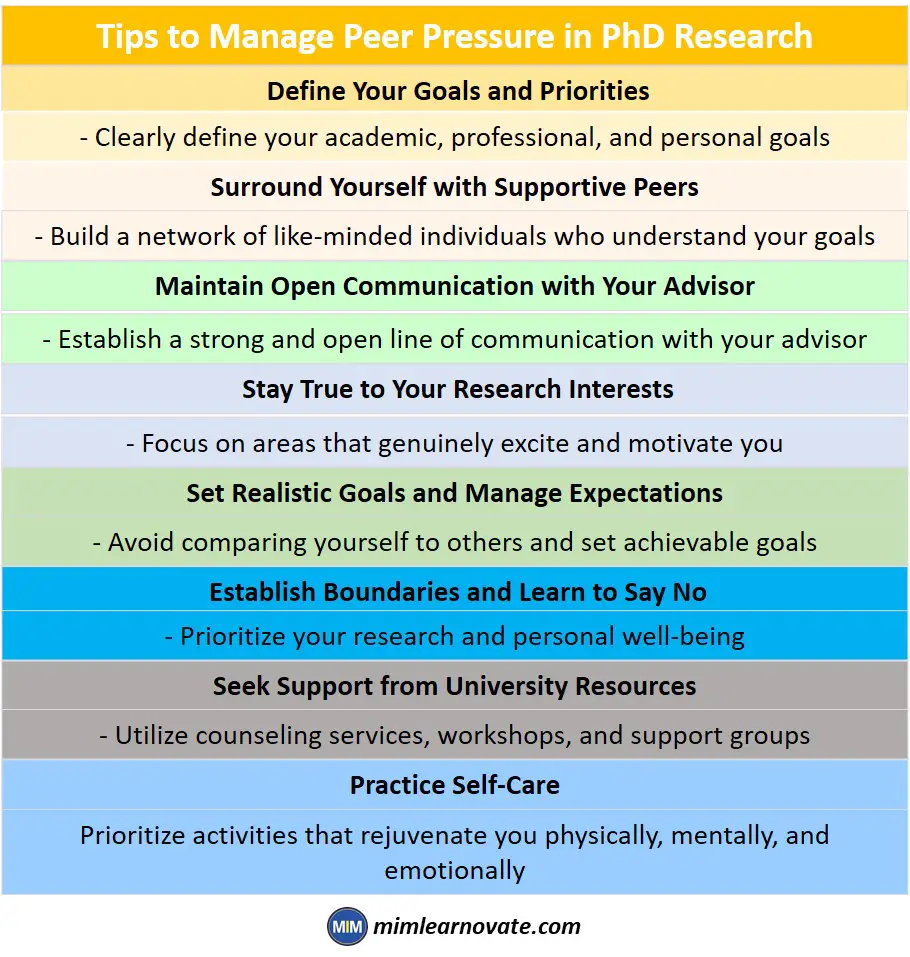Undertaking a PhD research journey is a significant undertaking that involves rigorous academic work, personal growth, and countless challenges.
Amidst the academic environment, it is common to encounter peer pressure that can influence decision-making, productivity, and overall well-being.
In this blog post, we will discuss tips to effectively manage peer pressure during your PhD research, enabling you to stay focused, motivated, and true to your own path.
Read More: Consequences of Peer Pressure: Real-Life Examples
Effective Tips to Manage Peer Pressure in PhD Research
Managing peer pressure in PhD research can be challenging, but it is possible. By following these tips, you can set yourself up for success.

1. Define Your Goals and Priorities
Before embarking on your PhD journey, take the time to clearly define your goals and priorities. Understand what you wish to achieve academically, professionally, and personally.
By having a clear sense of direction, you can resist the temptation of deviating from your own path due to peer pressure.
2. Surround Yourself with Supportive Peers
Build a network of supportive peers who understand and respect your research goals. Seek out individuals who share your passion for academic excellence and personal growth.
Surrounding yourself with like-minded individuals will create a positive environment where you can share experiences, seek advice, and receive encouragement without succumbing to negative peer pressure.
Read More: Types of PhD Guides
3. Maintain Open Communication with Your Advisor
Develop a strong and open line of communication with your advisor. Regularly discuss your research progress, challenges, and concerns with them.
An effective advisor-student relationship will help you navigate peer pressure by providing guidance and mentorship tailored to your unique situation. Your advisor can offer insights on managing expectations and help you stay on track.
4. Stay True to Your Research Interests
Peer pressure may lead you to pursue research topics or methodologies that align with others’ interests rather than your own.
It is crucial to stay true to your research passions and interests. Focus on areas that genuinely excite and motivate you, as this will enhance your productivity and satisfaction throughout your PhD journey.
5. Set Realistic Goals and Manage Expectations:
Peer pressure can arise from the desire to match the progress or achievements of fellow PhD researchers.
While healthy competition can be beneficial, it is essential to set realistic goals and manage your own expectations. Recognize that each PhD journey is unique, and progress may vary.
Instead of comparing yourself to others, focus on your own growth and celebrate your accomplishments.
6. Establish Boundaries and Learn to Say No:
Peer pressure can manifest in various forms, including excessive workloads, collaborations, or social commitments. Learn to establish healthy boundaries and say no when necessary.
Prioritize your research and personal well-being. It’s crucial to strike a balance between being a supportive colleague and protecting your own time and energy.
7. Seek Support from University Resources:
Universities often provide resources to support students’ mental health and well-being. Take advantage of counseling services, workshops, and support groups to help you manage stress, address anxieties, and gain valuable strategies for coping with peer pressure. Remember, seeking support is a sign of strength, not weakness.
8. Practice Self-Care
Self-care is vital in managing peer pressure and maintaining overall well-being. Prioritize activities that rejuvenate you physically, mentally, and emotionally.
Engage in hobbies, exercise regularly, maintain healthy relationships outside of academia, and allocate time for relaxation and self-reflection.
Taking care of yourself will help you stay resilient and better equipped to handle external pressures.
Read More: How to Balance Between PhD Thesis Writing and Job Search?
9. Celebrate small wins
It is important to celebrate your successes, no matter how small they may seem. This will help you stay motivated, and it will make it easier to deal with the challenges of PhD research.
10. Seek feedback wisely
Be selective about who you seek feedback from. It is important to get feedback from people who are supportive and who have your best interests at heart. Avoid getting feedback from people who are negative or who are only interested in tearing you down.
Read More: Consequences of Peer Pressure: Real-Life Examples
Conclusion:
Managing peer pressure during your PhD research is crucial for maintaining your authenticity, focus, and overall well-being. By defining your goals, surrounding yourself with supportive peers, maintaining open communication with your advisor, staying true to your research interests, and practicing self-care, you can navigate the challenges and thrive in your academic journey.
Remember, your PhD research is a unique opportunity for personal and professional growth, and it is essential to prioritize your own growth and aspirations.
Stay true to yourself and embrace the exciting possibilities that lie ahead.
Other articles
Please read through some of our other articles with examples and explanations if you’d like to learn more about research methodology.
Research
- Resources for PhD Literature Review
- Top 100 Google Scholar Journals
- 16 Reasons for Your Manuscript to Be Rejected by Reviewers
- How to Reach a Wider Audience in Research?
- Choose High-Impact Factor Journals
- Journal Publication Ethics for Authors
- Best Websites to Download Thesis and Dissertation
- Do All References in a Reference List Need to Be Cited in Text?
- Respondents To Fill Out a Dissertation Survey
- Stolen Unpublished Work
- Co-author Uses ChatGPT for Acedemic Writing.
- Article Retraction in Academic Publishing
- Write a 10 and 20-Page Research Paper in One Night
- Journal Submission Hacks
- How to Conduct a Research Survey
- Consistency in Ph.D. Research
- Peer Pressure in PhD Research
- Facts About Sci-Hub
- Finding Scopus Indexed Journals
- Scopus Indexed Journal
- Cloned Journals
- Timeline for Writing a Research Paper in a Month
- Why Do Paid Scientific Journal Publications Exist?
- Types of Plagiarism
- How GPTzero Detects ChatGPT-Generated Research Articles?
- Free Open Access Journals
- How to Conduct Community Member Research Interviews
- How Q1 Journals are Calculated?
- AI Detection Tools for ChatGPT-Generated Research Articles
- Sci-Hub Proxy Links Working
Citation Styles
- APA Reference Page
- MLA Citations
- Chicago Style Format
- “et al.” in APA, MLA, and Chicago Style
- Footnote Citation
- Do All References in a Reference List Need to Be Cited in Text?
Comparision
- Basic and Applied Research
- Cross-Sectional vs Longitudinal Studies
- Survey vs Questionnaire
- Open Ended vs Closed Ended Questions
- Experimental and Non-Experimental Research
- Inductive vs Deductive Approach
- Null and Alternative Hypothesis
- Reliability vs Validity
- Population vs Sample
- Conceptual Framework and Theoretical Framework
- Bibliography and Reference
- Stratified vs Cluster Sampling
- Sampling Error vs Sampling Bias
- Internal Validity vs External Validity
- Full-Scale, Laboratory-Scale and Pilot-Scale Studies
- Plagiarism and Paraphrasing
- Research Methodology Vs. Research Method
- Mediator and Moderator
- Type I vs Type II error
- Descriptive and Inferential Statistics
- Microsoft Excel and SPSS
- Parametric and Non-Parametric Test
PhD
- Tips for Completing PhD in 36 Months
- Resources for PhD Literature Review
- Top Highest Paying PhD Degrees
- Complete Your PhD in 3 Years
- Freelancing Ideas for PhD Researchers
- Consistency in Ph.D. Research
- How to Cope with Problematic PhD Supervisor
- Peer Pressure in PhD Research
- Consequences of Peer Pressure:
- Pros and Cons of Being an Older Student in a PhD
- PhD Students Seeking Industry Job
- How Long Does it Take for PhD in USA?
- How to Answer Unexpected Questions During PhD Viva?
- Difference Between M.Phil. and Ph.D.
- How to Balance Between PhD Thesis Writing and Job Search?
- Types of PhD Guides
Research
- Research Methods
- Quantitative Research
- Qualitative Research
- Case Study Research
- Survey Research
- Conclusive Research
- Descriptive Research
- Cross-Sectional Research
- Theoretical Framework
- Conceptual Framework
- Triangulation
- Grounded Theory
- Quasi-Experimental Design
- Mixed Method
- Correlational Research
- Randomized Controlled Trial
- Stratified Sampling
- Ethnography
- Ghost Authorship
- Secondary Data Collection
- Primary Data Collection
- Ex-Post-Facto
Comparision
- Independent vs. Dependent Variable
- Research Article and Research Paper
- Proposition and Hypothesis
- Principal Component Analysis and Partial Least Squares
- Academic Research vs Industry Research
- Clinical Research vs Lab Research
- Research Lab and Hospital Lab
- Thesis Statement and Research Question
- Quantitative Researchers vs. Quantitative Traders
- Premise, Hypothesis and Supposition
- Survey Vs Experiment
- Hypothesis and Theory
- Independent vs. Dependent Variable
- APA vs. MLA
- Ghost Authorship vs. Gift Authorship
Research
- Table of Contents
- Dissertation Topic
- Synopsis
- Thesis Statement
- Research Proposal
- Research Questions
- Research Problem
- Research Gap
- Types of Research Gaps
- Variables
- Operationalization of Variables
- Literature Review
- Research Hypothesis
- Questionnaire
- Abstract
- Validity
- Reliability
- Measurement of Scale
- Sampling Techniques
- Acknowledgements
- Data Coding
- Research
- Research Methods
- Quantitative Research
- Qualitative Research
- Case Study Research
- Survey Research
- Conclusive Research
- Descriptive Research
- Cross-Sectional Research
- Theoretical Framework
- Conceptual Framework
- Triangulation
- Grounded Theory
- Quasi-Experimental Design
- Mixed Method
- Correlational Research
- Randomized Controlled Trial
- Stratified Sampling
- Ethnography
- Ghost Authorship
- Secondary Data Collection
- Primary Data Collection
- Ex-Post-Facto
Statistics
- PLS-SEM model
- Principal Components Analysis
- Multivariate Analysis
- Friedman Test
- Chi-Square Test (Χ²)
- T-test
- SPSS
- Effect Size
- Critical Values in Statistics
- Statistical Analysis
- Calculate the Sample Size for Randomized Controlled Trials
- Covariate in Statistics
- Avoid Common Mistakes in Statistics
- Standard Deviation
- Derivatives & Formulas
- Build a PLS-SEM model using AMOS
- Principal Components Analysis using SPSS
- Statistical Tools
- Type I vs Type II error
- Descriptive and Inferential Statistics
- Microsoft Excel and SPSS
- One-tailed and Two-tailed Test
- Parametric and Non-Parametric Test



